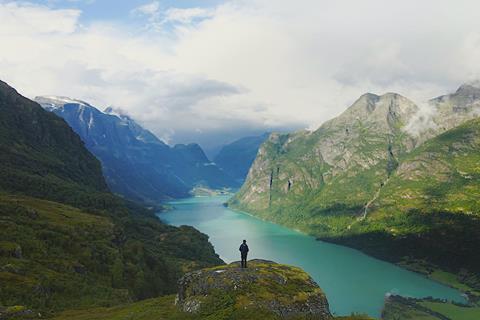Margreth Olin strides into the Norwegian landscape with her 84-year-old father in this arresting documentary

Dir/scr: Margreth Olin. Norway. 2023. 91mins
The relationship between filmmaker Margreth Olin and her father, Jorgen, has always been linked to nature, and the act of exploring the world on foot. And so, after another film was derailed by the pandemic, Olin embarked on this lyrical, strikingly beautiful project, returning to her childhood home in Oldedalen, in Western Norway and accompanying her 84 year-old father as he strides out on his daily hikes into what has been described as the most beautiful valley in Norway. It’s a quietly profound film, one that encourages appreciation of the world through exultant widescreen landscape shots, macro close-ups and textured field recordings of skittering bugs and crunching ice. It also preaches acceptance of the inevitable cycles of nature – cycles that we, as humans, should learn to embrace rather than fight against.
An arresting study of this particularly photogenic corner of Norway which repays a big-screen viewing
Olin’s previous work includes the award-winning fiction film The Angel (2009) and a co-directing credit on documentary A Self Portrait (2020). She embarked on Songs Of Earth with a first-rate specialist team, including several drone camera operators, a wildlife photographer, a sound recordist attuned to the music of the landscape and, in Rebekka Karijord, a composer who was able to capture that music in a gorgeous, haunting score. The result is an arresting study of this particularly photogenic corner of Norway which repays a big-screen viewing. As such, it should find other festival slots and could attract the interest of specialist distributors – the combination of epic scenery and an emotional connection to the land appealing to a similar audience to that of last year’s Fire Of Love. The presence of Wim Wenders and Liv Ullman on the credits as executive producers certainly won’t hurt its prospects.
There’s something rather satisfying about the fact that this film – with its boundless sense of discovery and its huge, generous expanses of mountain shearing through sky – was conceived just at the point when the rest of the world was shrinking. And while Covid-19 is not foregrounded as a theme in the film, mortality is. In a prologue, filmed in the home that Olin shared with her father and her mother, Magnhild, the three discuss death. Jorgen is calm and wise, arguing that, while grief is natural, what is important is to celebrate a life lived well. And for Jorgen, a fulfilling life is one which is dedicated to the two great loves of his life: Magnhild and the natural world.
When, as a child, Olin asked for a fairytale, Jorgen would offer a walk instead. Later, when the adult Olin sought solace from her father at a time of crisis, his advice was the same. And there’s a meditative quality to the rhythms of the footage of Jorgen hiking, frequently over challenging terrain, and then pausing to drink in every last detail of the scenery. It’s a landscape that he is still not tired of, even after over 80 years of gazing at it. If nothing else, the film encourages us to relearn the art of looking, properly absorbing and understanding the world around us.
It also explores the history and generational connection with the place – the proud spruce, which stands high on a hill above the village, was planted by Jorgen’s grandfather over a century before. Magnhild and Jorgen recite verses and songs written to celebrate the valley; they talk of tragedies, whole communities wiped out in landslides. It’s fascinating, and you rather wish the film contained more of this historical context. But then, Jorgen’s whole message is that we should not get so absorbed by concerns about the past – or indeed the future – that we lose our connection to the present.
Production company: Speranza Film AS
International sales: Cinephil info@cinephil.com
Producer: Margreth Olin, Lena Faye-Lund Sandvik
Cinematography: Lars Erlend Tubaas Øymo
Editing: Michal Leszczylowski
Music: Rebekka Karijord






![The Brightest SunScreen[Courtesy HKIFF]](https://d1nslcd7m2225b.cloudfront.net/Pictures/274x183/3/5/0/1448350_thebrightestsunscreencourtesyhkiff_312678.jpg)















![The Brightest SunScreen[Courtesy HKIFF]](https://d1nslcd7m2225b.cloudfront.net/Pictures/100x67/3/5/0/1448350_thebrightestsunscreencourtesyhkiff_312678.jpg)

